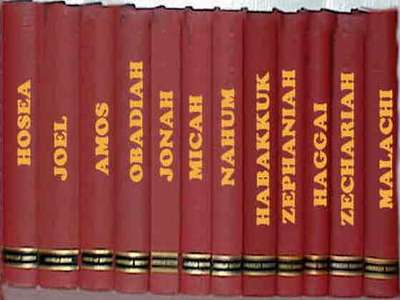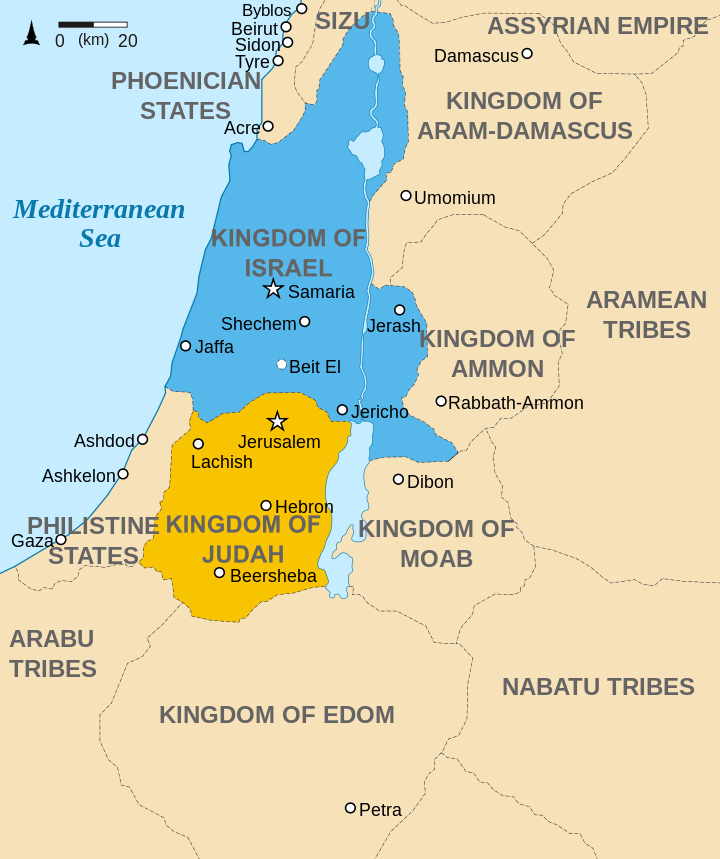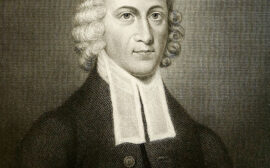One of the most misunderstood sections of Scripture is the unit of the Old Testament known as the “Minor Prophets.” When a person speaks about their favorite texts of the Bible, one rarely hears Zechariah, Habakkuk, Amos, or Zephaniah mentioned. It is really a tragedy that such is the case because the twelve books that comprise the section termed the “Minor Prophets” holds significant value for the believer. But one may ask, “Who are the Minor Prophets and what segment of Scripture does one reference”?
The Minor Prophets consist of twelve prophets in the Bible beginning with Hosea and ending with Malachi (which also ends the segment Christians call the “Old Testament”). The minor prophets include: Hosea, Joel, Amos, Obadiah, Jonah, Micah, Nahum, Habakkuk, Zephaniah, Haggai, Zechariah, and Malachi. These books are called “Minor” in contrast to the “Major Prophets” (which include Isaiah, Jeremiah, Ezekiel, and Daniel) due to the size of the writings, and thus do not address the prophets’ importance. The Minor Prophets were every bit as important as the Major ones. Since there are twelve Minor Prophets, many scholars address them simply as “The Twelve.” Some evidence suggests that since the Minor Prophets were significantly smaller than the Major Prophets, some compiled the writings of the Twelve onto one scroll to save space.
Some people have difficulty relating to the Minor Prophets. Part of the problem relates to a lack of knowledge as to who the Minor Prophets were and what their message was about. What was the message of the Minor Prophets and who were these individuals? In a future blog, we will address the message of the Twelve. But for now, let’s look at who these prophets were. It is important to note that by the time of the Minor Prophets that the kingdom of Israel had split into two sections. Rehoboam was king of the United Kingdom of Israel. He had succeeded his father Solomon. In 932 B.C., the Northern section of Israel led by Jeroboam rebelled and pulled away from Rehoboam’s reign due to Rehoboam’s heavy taxation (1 Kings 12:1ff). They established what was called the Northern Kingdom of Israel selecting Jeroboam as their ruler. The Northern Kingdom is sometimes simply called “Israel” during this time period. The Southern Kingdom, the area that was continued to be ruled by Rehoboam, is often called “Judea.” Bethel and Ai served as the border which divided the two kingdoms. Samaria was the capital of Israel and Jerusalem was the capital of Judea.
Hosea
Hosea was a prophet to the Northern Kingdom of Israel. Sometimes he mentions Judah, however the main focus of his message is to Israel. Hosea had a long ministry dating from 753 to 715 B.C.[2] Hosea completed his ministry and prophecy before the time that Assyria invaded Israel. Hosea is best known for his message of love and compassion. God told Hosea to marry Gomer, a woman who was quite promiscuous (Hosea 1:2). Gomer’s infidelity against Hosea symbolized the peoples’ infidelity against God due to their idolatry. Hosea continued to love Gomer and eventually took her back. Hosea’s love for Gomer represented the continued love that God held for the rebellious people. Anyone who thinks that the prophets were only “gloom and doom” needs to take a serious look at the message of Hosea.
Joel
Little is known about the prophet Joel outside of the fact that he was the “son of Pethuel” (Joel 1:1).[3] Joel prophesied to the Southern Kingdom of Judah during the days of Uzziah, a time “of unparalleled prosperity.”[4] Thus, Joel most likely prophesied sometime around 792-740B.C.). Joel demonstrates that natural disasters can serve as God’s judgment, but primarily demonstrates that God is a “God of grace and mercy (Joel 2:13, 17), of love and patience (2:13), and of justice and righteousness (1:15; 2:23; 3:1-8).”[5] Joel is best known for his prophecy pertaining to God pouring out His Spirit upon all flesh (Joel 2:28-31).
Amos
Amos is quite the interesting prophet. Many prophets were professional prophets who spoke before the king’s court and had paid positions. Amos, however, is not one of those prophets. If there was ever a “country prophet,” Amos was one. Amos was a tenderer of sycamore figs in Tekoa. Tekoa was around 10 miles south of Jerusalem. So, Amos was a Judean prophet preaching to Israel. Amos was a brave and bold man, going so far as to call the elite women of the time the “cows of Bashan on Mount Samaria” (Amos 4:1). A person is brave in any time to say something like that to a woman! Amos is known for his confrontation with Amaziah. Amaziah was a professional prophet who wanted to preach a message that the people would like. Amos was called to preach a message that the people needed to hear. Such a contrast is noted in modern times also. Amos preached his message around 760-750B.C. Amos’ message was one of repentance, calling people back to their first love. Amos condemned actions that demonstrated hatred towards God and towards fellow humanity. Israel was guilty of syncretism (the practice of blending their beliefs with others). Amos called them back to the truth. Amos is a man needed in modern times as much as he was in Israel.
Obadiah
Obadiah is one of those difficult prophets to date, mainly because nothing much is known about him. Obadiah pronounces judgment against Edom. Edom was an area around Mount Seir located southeast of the Dead Sea. Many feel that Obadiah prophesied, although greatly debated, around the destruction that came to Edom by Nebuchadnezzar around 586 B.C. Obadiah shows that God rules from on high. Political and national entities are subject to change, but God is over all. As Barker and Kohlenberger note, “The dual thrust of 1:1 indicates two levels at which human history moves. The Lord is the ultimate mover, but there is also an international political alliance, motivated only by callous self-seeking.”[6]
Jonah
Jonah is perhaps the most popular of the Twelve. Jonah was the son of Amittai (Jonah 1:1) from the area of Gath Hepher in Galilee.[7] Jonah was called by God to preach a message of repentance to Nineveh in Assyria. Assyria was an enemy of Israel. To say that Jonah was hesitant to preach to Nineveh is an understatement. Jonah rebelled against the calling of God, eventually landing in the belly of a “huge fish” (Jonah 1:17). Jonah was spit out of the fish (Jonah 2:10). Jonah, then, travelled to Nineveh and preached a message of repentance. To Jonah’s surprise, Nineveh listened! They were spared, albeit temporarily, from God’s judgment. Jonah presents a message of God’s love for all people. God is willing to forgive even when we are not.[8]
Micah
Micah produced a theologically rich prophecy in the 8th century B.C. Micah notes that he is from Moresheth (Micah 1:1) which was approximately six miles northeast of Lachish, twenty miles southwest of Jerusalem. Micah prophesied sometime before 722 to the end of the 8th century. Micah prophesied primarily against Judah, warning of the threat of judgment. Micah, as noted earlier, is a theologically rich work. Micah emphasizes God’s sovereignty over all nation (Micah 4:11-13), God’s immutability (Micah 7:18-20), on the remnant (Micah 4:11-13), divine redemption, and the messianic kingdom.
In the next article, we will examine the remainder of the Twelve. Be sure to look for the article “Who Were the ‘Minor Prophets’? Part Two: Nahum-Malachi.”
© September 26, 2016. Brian Chilton
Sources Cited
Barker, Kenneth L., and John R. Kohlenberger, III. Expositor’s Bible Commentary: Old Testament. Abridged Edition. Grand Rapids: Zondervan, 1994.
Notes
[1] Wikipedia Commons. Oldtidens_Israel_&_Judea.svg: FinnWikiNoderivative work: Richardprins (talk) – Oldtidens_Israel_&_Judea.svg, CC BY-SA 3.0, https://commons.wikimedia.org/w/index.php?curid=10872389.
[2] Kenneth L. Barker and John R. Kohlenberger, III., Expositor’s Bible Commentary: Old Testament, abridged ed (Grand Rapids: Zondervan, 1994), 1407.
[3] Unless otherwise noted, all quoted Scripture comes from the New International Version (Grand Rapids: Biblica, 2011).
[4] Barker and Kohlenberger, EBC, 1426.
[5] Ibid., 1427.
[6] Ibid., 1455.
[7] Ibid., 1460.
[8] Scholars debate the historicity of Jonah. Is Jonah an allegory or is it historical? In my opinion, since Jesus referenced Jonah as historical (Matthew 12:38-41), then one should remain open to the historical nature of the book. While it is improbable that a person could survive being consumed by a large fish, it is not impossible. God is master even over the fish, so it is indeed possible that God could have accomplished those things attributed to Him in the book.







[…] via Who Were the “Minor Prophets”? Part One: Hosea-Micah — BELLATOR CHRISTI […]
I don’t know if you have ever seen this before but while listening to a Dallas Theological Seminary class the professor gave a great illustration of remembering the dates of 7 OT prophets. The 5 8th century prophets can be remembered as Micah backwards HACIM… Hoses and Amos preached to the north, C for see for Jonah and Micah and Isaiah preached to the south. He also used OJ for Obadiah and Joel as there is no consensus as to when they preached and since OJ Simpson got a Not Guilty and we don’t know how that happened he used OJ for not really being 100% on a date for those two.
Love it!
I’m glad you liked it! I enjoy reading your posts as well and I’ll very thankful for them. I just noticed some of my phone’s auto correct errors and I apologize for that.
No worries. Thank you for your kind words. Feel free to share any of the articles that have been useful. Blessings, Brian.